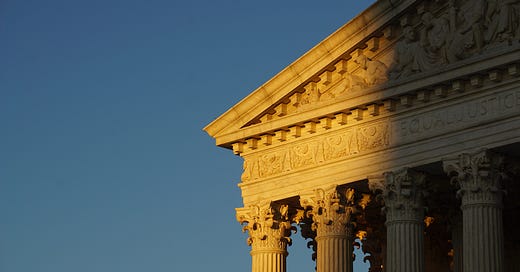Special Ed Families Can Sue Schools for Damages
What the new Supreme Court ruling means for special education families and school districts
Photo by Ian Hutchinson on Unsplash
For years, Miguel Perez sat in his classes at a small school in Michigan in a world of silence. His teachers talked and lectured, but he had no idea what they were saying. Miguel is deaf and wasn’t given the tools to understand the outside world.
Because their son received straight As and was on the honor roll, Miguel’s parents, who don’t speak English, were unaware there was a problem until it was time to graduate from high school. Then, Miguel was provided with a “certificate of achievement” rather than a diploma. Subsequent evaluations showed that Miguel read at a third grade level, even though he didn’t have any other disabilities. He did not know sign language at all and couldn't communicate with anyone, because the school district had not provided him with that education.
After his family’s first lawsuit, the school district gave Miguel some compensatory education, but the family also wanted to sue the district for damages. Those years of lost education would have a lifelong impact, their lawyers argued. Yesterday, in an unanimous decision, the Supreme Court ruled in favor of Miguel and his parents. They will win unspecified damages from their school district.
This case sets an important precedent. If Miguel can sue for damages, every special education student, who failed to receive crucial therapy or educational instruction, can sue for damages. This case is the most significant education decision by the courts in years. Schools will be forced to deal with the special education problem or face bankruptcy.
Most special education students aren’t getting an excellent education. It’s not a surprise to anybody who has spent more than a minute in a school building.
There are many excuses for the failures in special education. The federal government never provided the promised funding for special education. Schools don’t work their way to the top of state rankings for doing a great job in this area. Special education kids often have complicated challenges. Services for special education kids are extremely expensive.
Earlier this week, an advocacy group in New York City found that “37% of preschoolers with disabilities—a total 9,800 children—did not receive all their mandated special education services during the 2021–22 school year, a notable increase from the prior year, when 30% of preschoolers were not fully served.”
What if those nearly 10,000 families sued New York City for monetary damages? In the past, those 10,000 families would need an expensive lawyer to force New York City to do the right thing. If they won their case, after investing $10,000 of their own money, the district would just provide the student with extra therapy. Parents would have to sign an NDA, so other parents would be in the dark about the decision. Most families decide to hire private help, rather than go through an utterly horrific court case.
Now, families can hire lawyers that will work for a cut of a financial settlement, saving them from huge retainer fees. If a school really, really messed up, then the damages could be in the millions. How many children with autism in this country never received ABA therapy? A lot! How many kids, who never got proper therapy for mental health issues, hurt themselves? These cases could bankrupt the system.
Now, nobody wants public education to go bankrupt. I think even the angriest special education parent wants schools for their neighbors and their typical children. However, this case might be the kick in the ass to get something done.
In 2017, I wrote a couple of articles about another Supreme Court case, Endrew F. v. Douglas County School District. In that case, the Court ruled that schools were responsible for providing special education students with a meaningful education. In the past, schools were only expected to provide a “de minimis education” or just a little bit more than nothing.
Endrew was a big case, but it’s not clear if that decision actually made much of a difference for special education kids in this country. After all, it’s really hard to define “meaningful education.”
This case is different though, because there’s money attached. Parents can tell schools, “do a good job, or we sue your ass off.” Schools and their legal teams are going to have to completely rethink their entire system of special education.
Right now, schools try to evade providing services unless a parent complains, but that can’t continue. Children with dyslexia will have to be given a multi-sensory reading program, unless parents sign a waver declining those services. Students with autism will have to be offered behavioral services, speech therapy, social skills, physical therapy, and occupational therapy, unless parents sign a waver declining services.
Providing all this help will be awesome for our must vulnerable students, but it’s also going to be very expensive. Schools will need support from the federal government and health insurance companies to manage these costs.
LINKS
There has been awesome reporting on this case by my friends. I embedded some links in this story, but let me give an official shoutout here:
SCOTUS Considers When Students With Disabilities Can Sue for Damages, Linda Jacobson, The 74
Supreme Court Rules for Deaf Student, Jess Bravin, WSJ
Special education clash: Supreme Court sides unanimously for student with disability, John Fritze, USA Today
Last week, I wrote about adjunct professors on my primary newsletter, Apt. 11D.
Florida is considering a part-time public school enrollment plan. Lunchables are going to be rolled out directly to students. One school in Ohio has switched to a four-day school week. What happens to college towns, when enrollment drops? Highly recommend Jeff Selingo’s Next newsletter for college gossip.






That's great. This was pretty egregious. I wonder how much this case will push the barely functioning programs towards good.
Do you know if there is a statute of limitations for filing?